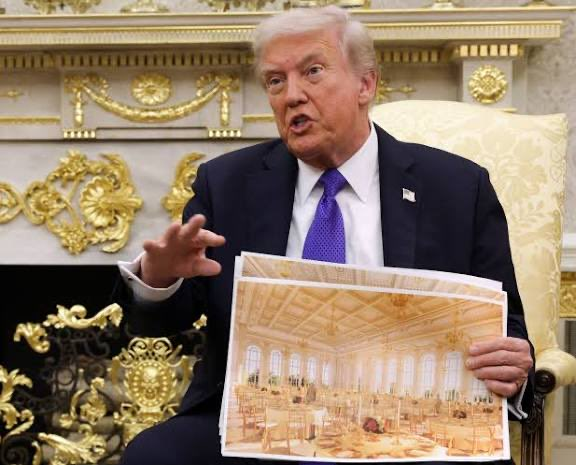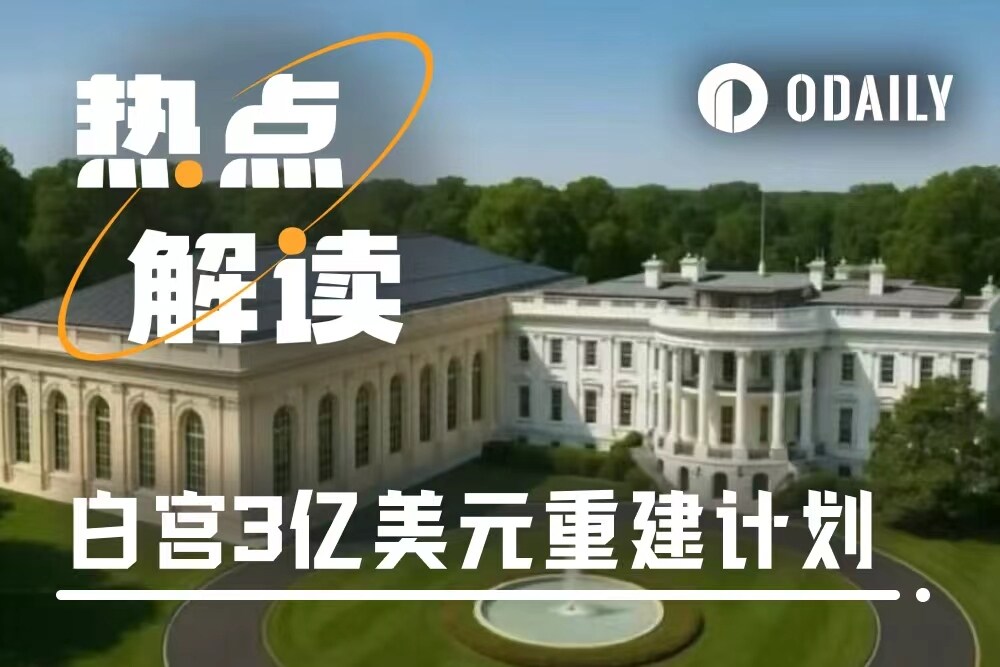Original | Odaily Planet Daily (@OdailyChina)
At a time when the U.S. government is in a shutdown, the excavators at the East Wing of the White House are roaring day and night.
U.S. President Trump personally approved this grand demolition project, not for national security, nor to make "America great again," but to build a privately funded 80,000 square foot banquet hall next to the White House.
A "Demolition and Reconstruction" Ceremony
The East Wing of the White House was built in 1942 and originally served as an entrance symbolizing the system and power: the First Lady's office, the White House Military Office, and the Social Secretary's office were all located in that understated yet solemn building. For decades, it has been the first door countless tourists stepped through to enter the center of American power. Now, that door has been temporarily closed. Last month, the White House announced an indefinite suspension of all public tours, citing the construction of the banquet hall.
As early as August of this year, Trump proposed building a new banquet hall at the White House. At that time, he stated that the new banquet hall would be "next to but not touching" the existing structure. By October 22, he confirmed in the Oval Office: "To properly complete this work, we must demolish the existing structure," as consultations with architects revealed that demolishing the entire East Wing would yield better results than partial demolition. Otherwise, it would detract from the "very, very expensive and beautiful building" of the new banquet hall. As he spoke, a model of the White House was on the table in front of him, and he was holding a rendering of the White House banquet hall.

Thus, the originally planned new banquet hall, which was to accommodate 650 people, has now expanded to nearly 1,000 people, with costs rising from the initial $200 million to around $300 million. A White House spokesperson stated that the East Wing would ultimately be "modernized and rebuilt" as a whole.
Where is the money coming from?
This is not an expenditure from the federal budget, but a "private crowdfunding" effort. Trump stated that the $300 million cost would not be borne by taxpayers but by private donors, including himself.
This is reasonable, as according to a recent Financial Times investigation, the Trump family's cryptocurrency business has achieved over $1 billion in pre-tax profits in the past year, and when accounting for paper gains, their net worth could increase by tens of billions of dollars. In light of such financial power, donations may just be a public relations expense for "leaving a mark in history."
Last week, Trump held a fundraising dinner, claiming to have received support from some "generous patriots and great American companies." According to a donor list released by the White House on October 23, it includes some of America's largest tech companies, such as Amazon, Apple, Google, Meta, and Microsoft. YouTube, a subsidiary of Google, has even agreed to pay over $20 million for the project. Additionally, defense and telecom giants like Lockheed Martin, Comcast, T-Mobile, and Palantir are also on the list.
More notably, the cryptocurrency industry has also made it onto the White House donation list. Ripple, Tether America, Coinbase, and the Winklevoss twins (Cameron and Tyler appear separately on the list) are all included. Ripple has become a symbol of "anti-regulation" in the cryptocurrency industry due to its protracted lawsuit with the SEC; Coinbase has long been maneuvering within the lobbying system, hoping to earn the label of "legitimacy."
For the past decade, the cryptocurrency industry has prided itself on being a "decentralized revolution," opposing the monopoly of traditional power. Now, they have entered a corner of history with a "donation" and proven with a bill that: the future of decentralization ultimately requires a center.
Of course, not everyone is pleased with this reconstruction. "In my view, this enormous banquet hall is a moral nightmare," said Richard Painter, a senior lawyer who served as a White House legal advisor during the Bush administration. "This is using access to the White House to raise money… these companies have demands from the government."
The brick walls of the East Wing are coming down, and a new hall is being laid. In this "reconstruction ceremony," new financial backers are entering the scene. The rules of the game in Washington have not changed—only this time, cryptocurrency capital has finally received its ticket to the entrance.
免责声明:本文章仅代表作者个人观点,不代表本平台的立场和观点。本文章仅供信息分享,不构成对任何人的任何投资建议。用户与作者之间的任何争议,与本平台无关。如网页中刊载的文章或图片涉及侵权,请提供相关的权利证明和身份证明发送邮件到support@aicoin.com,本平台相关工作人员将会进行核查。





